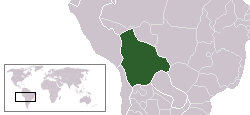Bolivian Congress refuse president's resignation
Thursday, March 10, 2005

The National Congress of Bolivia refused the resignation of the Bolivian President Carlos Mesa. The congress members of the Movement Toward Socialism (MAS) and the Indian Movement Pachakuti didn't support the decision.

(Image missing from Commons: image; log)
The President of Bolivia Carlos Mesa officially resigned last Sunday, March 6. At the occasion he explained his decision saying:
- I cannot continue governing and being threatened for a national blockade that strangles the country, for ultimata, strikes, threats and actions, that don't do anything else besides destroying our productive apparatus, our confidence, our future [...] The positions of the most important figures of Bolivian politics, and of some regional and syndical social organizations are taking Bolivia to a confrontation point that puts in risk, in my opinion, our future and our viability.

Mesa's resignation was influenced by the pressures of Evo Morales, both the leader of coca growers (cocaleros) and MAS. Morales caused the resignation of the former Bolivian president Gonzalo Sánchez de Lozada in October 2003.
The MAS resist the efforts of the Bolivian government to eradicate coca. The use of coca is an old tradition of Bolivian Indians, as tea, medicine, and during social events. The cultivation of coca is a financial resource to Bolívia. Bolivia is considered the world's third-largest cultivator of coca, after Colombia and Peru.
However the coca is also the raw material for cocaine. Coca products are exported to drug cartels in Argentina, Brazil, Chile, European Union, and the USA as reported by arrested drug dealers.
The MAS is pressuring the government so the new Hydrocarbons Law can be approved. The law aims to raise the taxes levied on hydrocarbon extraction. Mesa said that the law as stated is not viable.
Mesa has the support of part of Bolivian population. According to the analysts Carlos Valverde and Jorge Lazarte, Morales lost credibility with this crisis.
The opinion of Morales is that his public image has not deteriorated. He says that the Bolivian population will continue to support him. He also accuses Mesa of trying to favor the interests of oil companies, contrary to the interests of Bolivia. He announced that he will continue to organize protests against the government.
Labour unions and indigenous groups continue the blockage of roads in Bolivia to express their dissenting opinion against the government.
Related news
- "The President of Bolivia resigns" — Wikinews, March 8, 2005
Sources
- "Mesa to stay on as Bolivia leader" — BBC News, March 9, 2005
- "Bolivia unions intensify protests" — BBC News, March 10, 2005
- "The World Factbook - Bolivia" — CIA, February 10, 2005
- "Congreso ratificó a Carlos Mesa y comienza nueva era de poderes" — El Mundo (Bolivia), March 10, 2005
- Julio Penãloza Bretel. "El Presidente se queda, pero el bloqueo continúa" — El Tiempo (Bolivia), March 9, 2005
- "Mesa negoció, logró un acuerdo y fue ratificado por el Parlamento" — La Razón (Bolivia), March 9, 2005
- "El presidente de Bolivia, Carlos Mesa, oficializó su renuncia" — El Tiempo (Colombia), March 7, 2005
- "Bolivia President Mesa Resigns as Protests Spread" — Reuters, March 6, 2005
- "Detentos comandam rede de tráfico de dentro das celas" — O Estado de São Paulo, September 4, 2004
- Felipe Werneck. "PF descobre refinaria de coca no Rio" — O Estado de São Paulo, August 23, 2004
